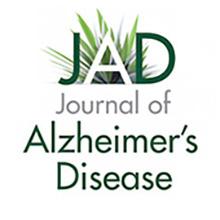20 December 2022

Frankfurt, Germany - Since December 2019, more than 60 million people have been diagnosed with coronavirus disease 2019 (COVID-19) worldwide, while approximately six million individuals have died as a result of the disease. Hospital treatment was required in about 10%–20% of COVID-19 patients, with this proportion decreasing over time. Several studies have shown the impact of dementia on mortality in COVID-19 patients, however, most studies were conducted during the first months of the COVID-19 pandemic.
The goal of the present study, which will be published in the next issue of the Journal of Alzheimer’s Disease, was to verify the association of dementia diagnosis with the risk of mortality as a result of COVID-19 among patients treated in several large hospitals in Germany over a long interval during the pandemic.
“It is possible that the effects of dementia on COVID-19 mortality may have changed over time, especially after vaccines became available and were broadly administered and as different variants of SARS-CoV-2 evolved,” explains Prof. Dr. Karel Kostev, PhD (right), from the Department of Epidemiology of the IQVIA. “In view of these factors, it is important to conduct studies that include patients diagnosed with COVID-19 across a long time period of the pandemic.”
This retrospective study was conducted and analyzed by the Asklepios hospital group. It was based on anonymized electronic medical data from public healthcare service hospitals across Germany. It included 28,311 patients with a confirmed COVID-19 diagnosis hospitalized between March 11, 2020 and July 20, 2022. For the present study, demographic data (age, sex), COVID-19 relevant data (ventilation, mortality), time of COVID-19 diagnosis, and co-diagnosis data were used.
The main outcome of the study was the association of dementia diagnosis with an increased risk of death during the hospital stay. The association between dementia and death was studied using multivariable logistic regression adjusted for age, sex, cancer, diabetes mellitus, lipid metabolism disorder, obesity, heart failure, ischemic heart disease, cerebrovascular disease, cirrhosis of the liver, and probable COVID-19 variant. Univariate conditional logistic regression was conducted for matched pairs to study the association between dementia and death.
Of 28,311 patients diagnosed with COVID-19, 3,317 (11.3%) had a dementia diagnosis. Prior to matching, 26.5% of dementia patients and 11.5% of non-dementia patients died; the difference was smaller within the matched pairs, with 26.5% of dementia vs. 21.3% of non-dementia patients dying.
In the multivariable logistic regression, dementia was associated with an 84% (OR=1.84; 95% CI: 1.52–2.24) increase in the risk of death. In the univariate logistic regression conducted for matched pairs, dementia was associated with a 33% (OR=1.33; 95% CI: 1.16–1.53) increase in the risk of death.
 “Dementia was associated with an increased mortality risk, but the association was weaker than that reported in the majority of previous publications,” noted PD Dr. Marc Axel Wollmer, MD (left), director of the department of Gerontopsychiatry from the Asklepios Hospital Nord-Ochsenzoll in Hamburg “To the best of the authors' knowledge, this is one of the first studies to have investigated the association between dementia and COVID-19 mortality using data collected for more than two years and applying two different statistical methods in parallel.”
“Dementia was associated with an increased mortality risk, but the association was weaker than that reported in the majority of previous publications,” noted PD Dr. Marc Axel Wollmer, MD (left), director of the department of Gerontopsychiatry from the Asklepios Hospital Nord-Ochsenzoll in Hamburg “To the best of the authors' knowledge, this is one of the first studies to have investigated the association between dementia and COVID-19 mortality using data collected for more than two years and applying two different statistical methods in parallel.”
The authors of the study also note that “although SARS-CoV-2 has changed over time and vaccination has greatly improved the prognosis of individuals who contract COVID-19 in general, further studies are needed to identify, prevent, and treat risk factors for mortality of this disease.”
Two major strengths of this study are the large sample size (n=28,311) and the inclusion of patients diagnosed with COVID-19 across a long period of the pandemic from March 2020 to July 2022. However, our study is also subject to a number of limitations. No detailed information is available on the causes of death in those patients who died. Most but not all mortality cases listed COVID-19 as the main cause of death. In addition, no medications used for COVID-19 therapy and no other medications were analyzed. Information on the vaccination status of the patients included in the study was missing. Although Germany actually has a very high COVID-19 vaccination rate among the elderly population, the period of this study also included the year 2020 when no vaccinations were available. Furthermore, data on socioeconomic status (e.g., education and income) and lifestyle-related risk factors (e.g., smoking, alcohol consumption, and physical activity) are also lacking. These possible confounders could not be matched in our analysis, which would have been desirable.
# # #
Contact:
Diana Murray
IOS Press
Tel: +1 718-640-5678
E-mail: d.murray@iospress.com
www.j-alz.com
NOTES FOR EDITORS
Title of paper: “Is Dementia Associated with COVID-19 Mortality? A Multicenter Retrospective Cohort Study Conducted in 50 Hospitals in Germany” by Kostev, Karel | Gessler, Nele | Wohlmuth, Peter | Arnold, Dirk | Bein, Berthold | Bohlken, Jens | Herrlinger, Klaus | Jacob, Louis | Koyanagi, Ai | Nowak, Lorenz | Smith, Lee | Wesseler, Claas | Sheikhzadeh, Sara | Wollmer, Marc Axel: DOI 10.3233/JAD-220918, published in Journal of Alzheimer’s Disease, Volume (91) Issue (2) by IOS Press. https://content.iospress.com/articles/journal-of-alzheimers-disease/jad2...
The study was not funded by any pharmaceutical companies and is a result of the independent research activities of Asklepios with support of IQVIA.
For additional information, contact Diana Murray, IOS Press, at +1 718 640-5678 or d.murray@iospress.com. Journalists wishing to interview the study’s authors should contact Prof. Dr. Karel Kostev, Epidemiology, IQVIA, at +49 0 69 66 04 4878 or karel.kostev@iqvia.com.
ABOUT THE JOURNAL OF ALZHEIMER’S DISEASE
Now in its 25th year of publication, the Journal of Alzheimer's Disease (JAD) is an international multidisciplinary journal to facilitate progress in understanding the etiology, pathogenesis, epidemiology, genetics, behavior, treatment, and psychology of Alzheimer's disease. The journal publishes research reports, reviews, short communications, book reviews, and letters-to-the-editor. Groundbreaking research that has appeared in the journal includes novel therapeutic targets, mechanisms of disease, and clinical trial outcomes. JAD has a Journal Impact Factor of 4.106 according to Journal Citation Reports™ (Clarivate, 2022). www.j-alz.com
ABOUT IOS PRESS
IOS Press is an independent international scientific, technical, medical (STM) publishing house established in 1987 in Amsterdam. We produce around 90 journals and 70 books annually in a broad range of subject categories, primarily specializing in health and life sciences (including neurosciences, medical informatics, cancer research, and rehabilitation) and computer sciences (including artificial intelligence, data science, and semantic web). In addition, we offer specialized services that support scientific advancement. www.iospress.com







